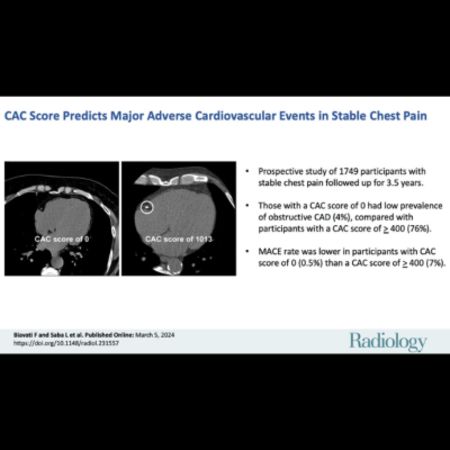Coronary artery calcium (CAC) scoring is a valuable tool in assessing cardiovascular risk, providing insight into the likelihood of major adverse cardiovascular events (MACE). Studies consistently show favourable outcomes and low MACE rates for individuals with a CAC score of 0. Landmark studies, including MESA, PROMISE, and SCOT-HEART, emphasise the significance of a CAC score of 0 in various clinical scenarios, such as asymptomatic individuals and those with stable chest pain. The 2021 American Heart Association/American College of Cardiology guidelines recognise the clinical utility of a 0 CAC score in identifying patients with stable chest pain and a low risk of future cardiovascular events. However, more research is needed to understand the prognostic implications of CAC scoring in individuals referred for invasive coronary angiography with stable chest pain. A study published in Radiology aims to close this research gap.
Insights from the DISCHARGE trial
A predefined CT subgroup analysis was conducted within the Diagnostic Imaging Strategies for Patients With Stable Chest Pain and Intermediate Risk of Coronary Artery Disease (DISCHARGE) trial. The DISCHARGE trial was a pragmatic, multicenter, randomised study, aimed to compare the effectiveness of CT versus ICA in individuals with stable chest pain and a clinical indication for ICA. The hypothesis was that the incidence of major adverse cardiovascular events (MACE) would differ significantly based on coronary artery calcium (CAC) scores. The primary objective of this analysis was to assess the prognostic value of CAC scoring in predicting MACE during a median follow-up of 3.5 years.
The DISCHARGE trial recruited 3561 participants across 26 centers in 16 European countries, with 1808 participants randomised to the CT arm. Ethical review was conducted, and written informed consent was obtained from all participants. This subgroup analysis focused on 1749 participants from the CT arm who had CAC score data available, excluding those with missing data or who did not undergo scheduled CT examination. The participants were divided into three CAC score categories: 0, 1–399, and 400 or higher, with respective proportions of 43.2%, 42.5%, and 14.3%.
Coronary artery calcium scoring as a prognostic tool in individuals with stable chest pain
Individuals with stable chest pain and an intermediate probability of coronary artery disease (CAD) referred for invasive coronary angiography showed that a coronary artery calcium (CAC) score of 0 was associated with a lower prevalence of obstructive CAD (4.1%; P < .001) and a low major adverse cardiovascular events (MACE) rate of 0.5% over 3.5 years (P < .001). This suggests that CAC scoring effectively rules out MACE in symptomatic individuals with stable chest pain and an intermediate pretest probability of CAD.
These findings align with results from other randomised controlled trials, such as PROMISE and SCOT-HEART, which investigated the association between CAC scores and MACE in individuals with stable chest pain. The PROMISE sub analysis indicated that a CAC score of 0 correctly excluded obstructive CAD in 97.3% of participants, while the SCOT-HEART trial showed that a CAC score of 0 reliably ruled out obstructive CAD in 98% of individuals. Both trials also demonstrated a lower risk of MACE associated with a CAC score of 0.
Furthermore, landmark studies in asymptomatic individuals, like MESA, consistently showed that a CAC score of 0 is highly accurate in minimising the risk of MACE. The study, focusing on CAC scoring in individuals referred for invasive coronary angiography, fills an important research gap and provides valuable insights for patients initially considered for this procedure.
Strengths of our study include its diverse patient population from multiple clinical centres across Europe and substantial representation of female patients, addressing historical sex bias in cardiac trials. A coronary artery calcium score of 0 showed a very low risk of major adverse cardiovascular events (MACE) at follow-up, and increasing scores were associated with increasing rates of obstructive coronary artery disease, revascularisation, and MACE. However, limitations include the focus on patients with stable chest pain and the midterm follow-up duration. Future studies with longer follow-up periods are needed to assess the long-term predictive accuracy of CAC scoring in symptomatic patient populations.
Source & Image Credit : RSNA Radiology























